Germany(FAU - University of Erlangen Nuremberg)
Global
Eichhorn Franziska
| Name | Eichhorn Franziska |
|---|---|
| Home University(Country) | Friedrich-Alexander Universität Erlangen-Nürnberg (University of Erlangen Nuremberg) |
| Department at home university | Material Science and Engineering |
| Research Period at NITech | 4.6.2013~29.7.2013 |
Campus gallery
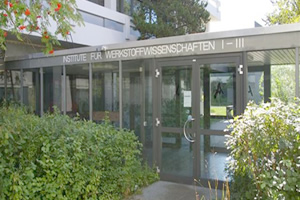
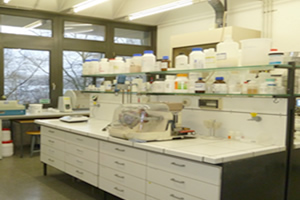
About your school
- Major reason to enroll to the home university
- I is in the near of my hometown and I liked Erlangen more than Bayreuth
- Fields at the most prevailing at your school
- my university is to big to describe all fields (we have got engine building, material science and engineering, bio-and chemical engineering, electronics, energy technology,...). My department has got 8 different fields: polymers, ceramics/glass, surfaces, biomaterials, simulation, metalls, materials, materials in the electronic; at glass and ceramics we are very interested in piezoelectric ceramics, fire proof ceramics, composites, cellular ceramics,...
- Points you can be proud of your home university
- It is a very traditional and big university with connection in the complete world. The FAU is known in the complete world. And the materials science are in the top ten of the best universities of material science
- When the semester starts and ends?
-
- Summer semester: April - September
- Winter semester: October - March
- Are there any courses offered instructed in English?
- Yes. The material science and the bio-and chemical engineerings offer the MAP (master of advanced materials and production). In this Master course are nearly all lectures in English
- Tell us what you find the differences between home university and NITech in terms of school life, like taking courses or conducting research.
- The Master cours is totally different in Japan and in Germany. In Germany you have got 1,5 years lectures and only 6 month Master thesis. In Japan you have got 2 years of reaserch with some lectures. In Germany you stay mostly between 8:15 and 16 o'clock at the university, the rest of the day is free. In Japan you spend nearly your complete day at the university. in Germany "you work and go", in Japan you work little bit slowlier and stay much longer. The students in Japan work like the PhDs in Germany, in the labs aren't technical workers like in Germany. In Japan you have to pay a fee of studies. In Germany not.
About residence, circumstances around school and daily life
- Monthly rent in average for university students
- All 6 month 42€ (about 4200Yen). In 1 yerr 84€ (8400Yen). No monthly rent
- Circumstances around University (eg; nearby hospitals, easy access to downtown, countryside, etc.)
- The technical part of the FAU is in the south of Erlangen. You are in 20 min at the city center (there are the train station, big shopping malls, the hospital). You can easily go by bike.
- Year-round weather condition comparing with that of Nagoya
- In the summer in Germany there are temperatures of 25-32°C with less humidity. The hottest month are June and July. The winter is between November and March. Febuary is the coldest month. There you can get -10°C, but most of the time about 0°C- (-5°C). We have got short summers and long winter. so I think it is better for Japanese to come in the summer semester.
- Monthly living cost and its breakdown
- If you life in a flat for students you pay about 250€ each month + water and electricity. Plus about 60€/week for eating, drinking, going out. Sightseeing is more expensive. Many students life at home, so they only pay the bus, train or car. Some students live in normal flats which are very expensive in Erlangen (about 350-550€)
Message to NITech student
- Message to NITech student wishing to go abroad to your home university
- Don't take 200 and 500€ bills with you. In Germany 5€, 10€, 20€, 50€ and 100€ bills are most comment. You can't use your credit card everywhere. EC cards are more comment. In Germany you can get easily a prepaid sim card, but most of the Japanese smartphones are sim-locked, so you need an other mobilephone. Not everybody in Germany speaks English. In a university city there aren't problems, but if you want to go to the country side there are more problems. Mostly you get a tutor at the FAU who will helps you during your stay and especially on the first day. The working days in Germany are much shorter than in Japan. You are allowed to work during 7 and 19 o'clock, but never allone and never more than 12 hours with your way to the university and back to your home. On Fridays most of the people only work till about 15 o'clock.
Schwarz, Lukas
| Name | Schwarz, Lukas |
|---|---|
| Home University(Country) | Friedrich-Alexander-Universität Erlangen-Nürnberg (Germany) |
| Department at home university | Material Science and Engineering |
| Research Period at NITech | 7.5.2013~2.8.2013 |
Campus gallery
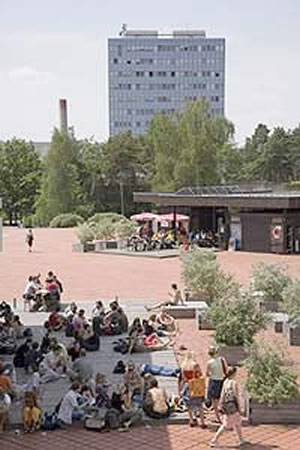
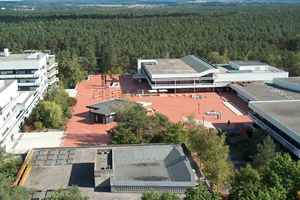
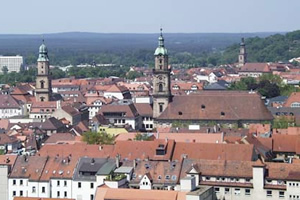
About your school
- Major reason to enroll to the home university
- It's a top level university in a beautiful city that is connected to global players like Siemens AG and prestigious research institutes like Fraunhofer-Gesellschaft. The city of Erlangen may be small, but it has many cultural assets, and student life is a big part of the city as well.
- Fields at the most prevailing at your school
- Faculty of Medicine, Faculty of Engineering (especially the Department for Materials Science and Engineering, including Medical Engineering)
- Points you can be proud of your home university
- The mp3 format was invented in Erlangen as part of a collaboration between the University of Erlangen and the Fraunhofer Institute. The Department fo Materials Science and Engineering is one of the biggest of its kind in Germany.
- When the semester starts and ends?
-
- Summer semester: April - September
- Winter semester: October - March
- Are there any courses offered instructed in English?
- There are many international study programmes (mostly Master courses at the Faculty of Engineering): Advanced Optical Technologies, Advanced Materials and Processes, Bavarian Graduate School for Computational Engineering, Chemical and Biological Engineering, Computanional Engineering, Communications and Multimedia Engineering, Life Science Engineering
- Tell us what you find the differences between home university and NITech in terms of school life, like taking courses or conducting research.
- Unfortunately, I don't know anything about the courses at NITech because I only work at the laboratory. Conducting research at NITech is very uncomplicated because the laboratory equipment is easy to access (there are no long waitlists). This is maybe a bit more difficult in Erlangen. But in Germany, no student stays at any Institute for longer than 6:00 p.m. Generally, I think that school life in Erlangen is pretty relaxed. Of course, this changes at the exam periods at the end of the terms.
About residence, circumstances around school and daily life
- Monthly rent in average for university students
- ca. 20,000 Yen - 40,000 Yen (there is no "International House" like the one at NITec, but there are some dormitories that prefer international students)
- Circumstances around University (eg; nearby hospitals, easy access to downtown, countryside, etc.)
- Erlangen is very small, so the the university medical centre, the downtown area, and the countryside are all easily reachable by bicycle or bus within a few minutes. There's a good train connection to Nürnberg which takes about 25 minutes.
- Year-round weather condition comparing with that of Nagoya
- There are also four seasons in Erlangen, but it's generally around 5 degrees colder than in Nagoya. The summer is not as humid as in Nagoya and there is no rainy season, but sometimes it can get quite hot as well. The Winter can be very cold with lots of snow, but sometimes there is almost no snow at all. I think the weather in Germany is very changeful.
- Monthly living cost and its breakdown
- ca.60,000 Yen - 90,000 Yen (depending on the rent and, of course, on the student's lifestyle)
Message to NITech student
- Message to NITech student wishing to go abroad to your home university
- Do it - don't worry, you won't regret it! You will find many new friends and learn a lot about German culture and society. Nagoya and Erlangen are two very different cities, but you will find out that Japanese and German people are not so different as you might think (although there are some funny differences, of course). You will have lots of fun and a great experience - and you will also gather some useful knowledge for your studies and your career.
Back to TIPs on home universities of international students who studies at NITech

 Japanese
Japanese